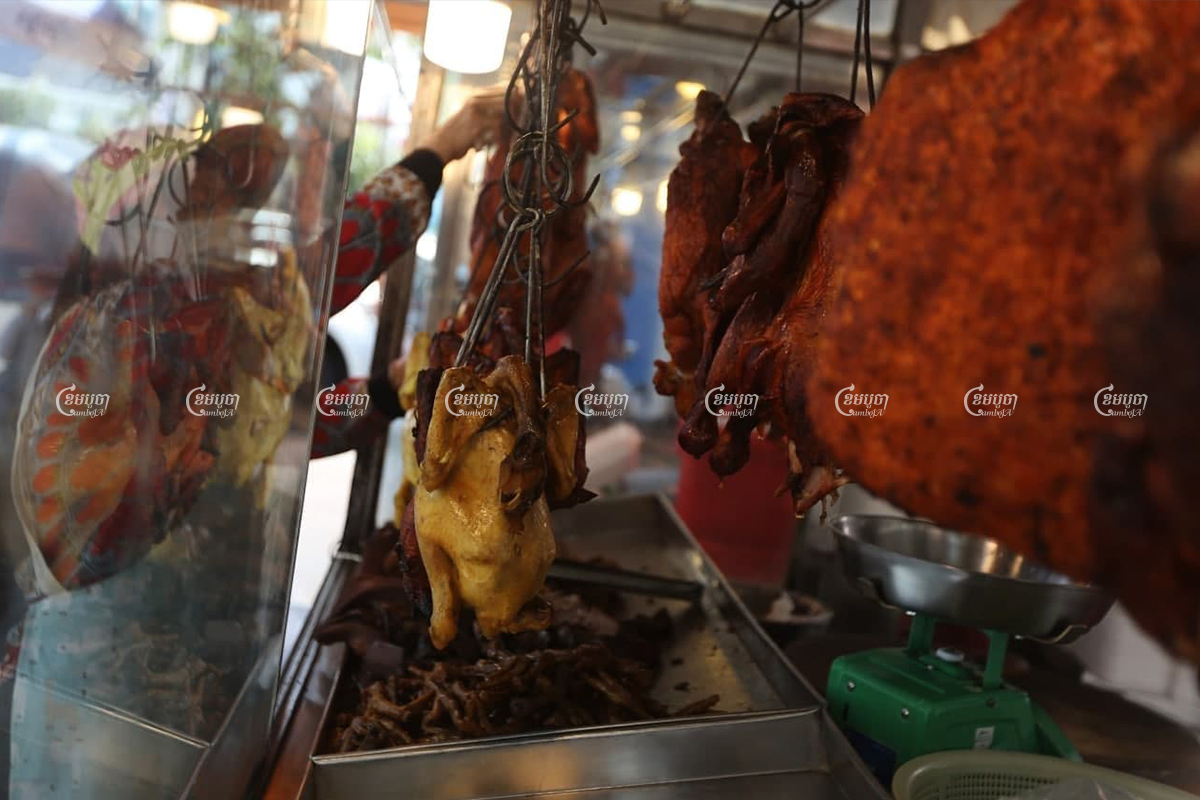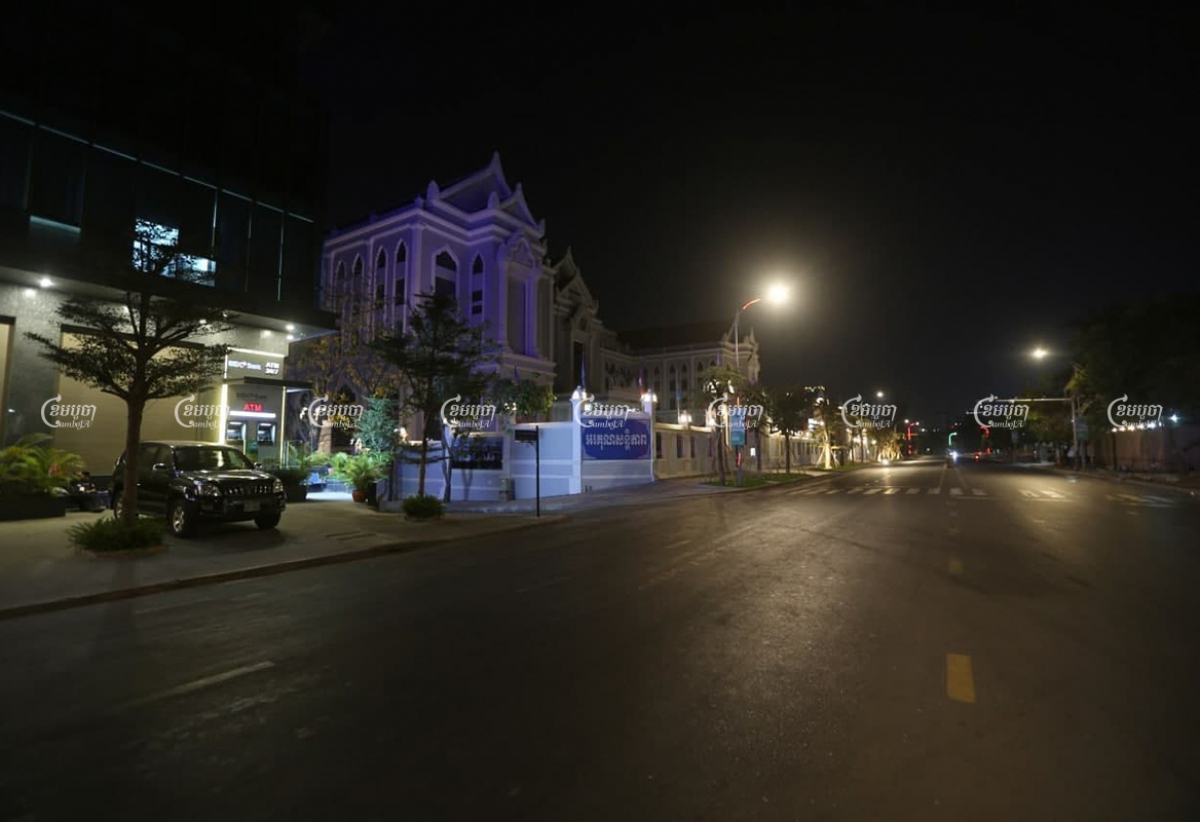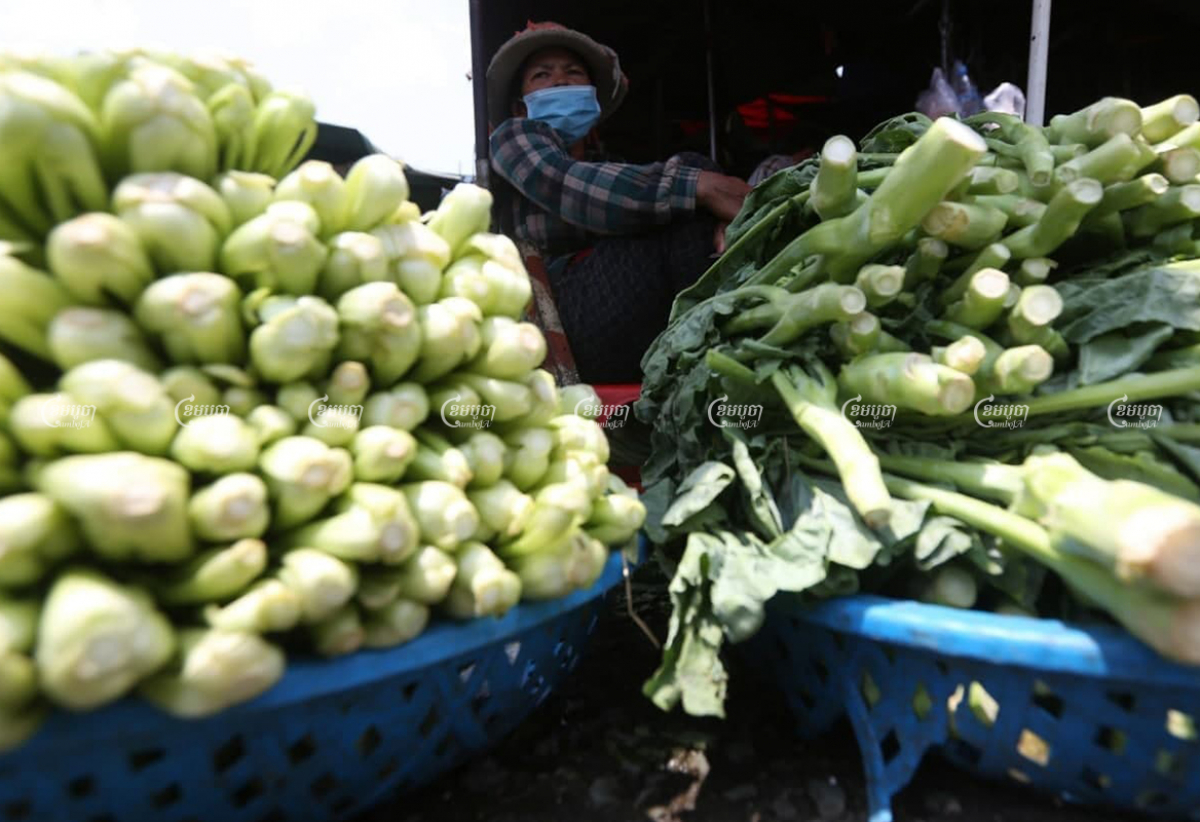The Phnom Penh joint authority will start fully implementing an overnight, citywide curfew as a COVID-19 prevention measure at 8 p.m. today.
Though the curfew officially began Thursday, police ran that first night as an informational session, clearing residents from the street with just a warning to adhere to the public order. Now, those who are found in public spaces within the 8 p.m. to 5 a.m. curfew period may be subject to stricter enforcement.
Phnom Penh Police spokesman San Sok Seiha said possible penalties for those breaking the curfew from Friday onward could include police confiscation of a violator’s motor vehicle and ordering of a 14-day home quarantine. Seiha explained officials took positions in public places Thursday to begin implementation of the curfew. Most people respected and followed the measure, he said, and only a small number were out during the enforcement period. Police officials advised and educated those people, explaining the administrative measure to contain COVID-19.
Seiha added that joint force authorities also went to Doeumkor Market and Neak Meas Market to advise people there about the curfew.
“If they were market sellers in the night, they need to have a certificate from their market owners or local authorities,” he said, adding that the same applied for other popular city markets such as Boeng Keng Kang Market. “If someone does business and works in the night, please join to respect the curfew.”
According to a two-week curfew order signed by Phnom Penh Governor Khuong Sreng on April 1, businesses including restaurants, cafes and bars are not permitted to have customers on-site during restricted hours but are allowed to continue delivery services. Travel within the city is also banned except for urgent medical reasons, delivery and cargo drivers, firefighters, some workers and special cases allowed by authorities, the governor announced.
The curfew directive also says violators could face additional legal penalties introduced recently in response to multiple breaches of COVID-19 protocols.
Phnom Penh Police Chief Sar Thet could not be reached by CamboJA for comment but posted some clarification of the curfew on his personal Facebook page.
“Individuals who work in public and private institutions who leave after 8 p.m. must have a certificate from [their employer] and must wear a card,” he wrote.
Chhorn Proch, 38, a meat and roast duck seller in Phnom Penh’s Por Senchey district, said the curfew would significantly affect sellers like himself who work at night.
“I can do good business between 7 p.m. to 10 p.m.,” said Mr Proch. “[Now], the people who want to eat meats and roast ducks, they do not dare to drive cars or motorbikes at that time.”
He said that before City Hall issued the curfew, he could sell 20 kg of meat and about 30 roast ducks. On Thursday night, Proch was reduced to only 6 kg of meat and 10 ducks, about a third of what he sold before.
“Now I don’t know where I get money to pay the rent for my house, electricity and water fees,” he said. “First, [my selling] was affected by the COVID-19 pandemic, but it is additionally affected by this curfew.”
If it were up to him, Proch said he would request City Hall to start the curfew later, at 10 p.m., to allow for people who leave work about 6 p.m. to have enough time to attend to personal business, such as buying dinner, before going home for curfew.
 Phnom Penh streets were emptied by 8 p.m. Thursday after Phnom Penh authorities announced an overnight curfew intended to halt the growth of Cambodia's Covid-19 outbreak. The two-week curfew bans travelling in public places from 8 p.m. to 5 a.m. Photo taken April 1, 2021. CamboJA/ Pring Samrang
Phnom Penh streets were emptied by 8 p.m. Thursday after Phnom Penh authorities announced an overnight curfew intended to halt the growth of Cambodia's Covid-19 outbreak. The two-week curfew bans travelling in public places from 8 p.m. to 5 a.m. Photo taken April 1, 2021. CamboJA/ Pring Samrang Expected to clear the streets for a two-week curfew that all but eliminates prime selling hours, a vendor waited for costumers Friday at Deumkor Market in Phnom Penh, April 2, 2021. CamboJA/ Pring Samrang
Expected to clear the streets for a two-week curfew that all but eliminates prime selling hours, a vendor waited for costumers Friday at Deumkor Market in Phnom Penh, April 2, 2021. CamboJA/ Pring Samrang
Khan Srey Aun, 22, a vegetable trader who buys her stock overnight from Doeumkor Market, told CamboJA that she and her husband typically leave their home to buy their goods as late as 1a.m. to prepare their selling operation at 3 a.m. at Chumpouvan Market in Por Senchey district.
She said the curfew will surely affect people like her who work while others are asleep.
“Today, my husband went to get the certificate from the market’s owner to use it at night to avoid police officials confiscating our motorbike,” Ms Srey Aun said, though she added her real worry is for her customers. “They will not dare to take the vegetable in the early morning like the past.”
Ms Srey Aun also said she was concerned the curfew might present an opportunity for police officials to arrest motor drivers in the night or extort them, and beseeched officials to be aware of that.
Met Measpheakdey, City Hall spokesman, estimated 90 percent of city residents followed the curfew on Thursday night.
“I hope that for two weeks more, our people will join to respect the curfew,” Mr. Measpheakdey said, though he questioned whether some people who do not understand the curfew have read the order yet. He said requests to change the timing of the curfew cannot be accomodated, adding that sellers who transmitted COVID-19 to their customers would feel remorse.
“If they cannot sell goods in the night, they can change to sell in the day,” Mr. Measpheakdey said. “I don’t believe that for two weeks, they will die by starvation but if they are infected [with COVID-19], they could die.”
Pech Pisey, executive director of Transparency International Cambodia, said City Hall should have studied to find the highest-risk sectors for COVID-19 transmission before enacting a ban across all of Phnom Penh. As it is, the curfew will affect all who make their living at night, including those like Proch and Srey Aun.
“For my idea, we should study whether where COVID-19 infected the most [people] in the past, for example, casinos, KTVs and other entertainment places,” Mr. Pisey said. “Those places are high risk for infection, so we can close them.”
With a prior study, he added, the government could have shut down activity in places where COVID-19 is spreading, rather than ban everything at once.
“The big concern, [the curfew] affects people’s living who do small business,” Mr. Pisey explained. “They need income every day because this group is easily suffering.”
Phnom Penh is the first municipality to announce a curfew but was closely followed by Kampong Speu, where provincial authorities on Friday issued a directive establishing a similar two-week curfew restricting nighttime travel and business. The restrictions are similar to those now in effect in Phnom Penh, though there are few confirmed COVID-19 cases in Kampong Speu.
Prime Minister Hun Sen said Friday through a message on TVK and other social media Friday the capital is the central location of the COVID-19 outbreak. While COVID-19 vaccines will be provided for all provinces, he said, the majority will need to go to Phnom Penh, which is by far the country’s largest urban center.
The prime minister said Phnom Penh has access to 400,000 doses of Sinopharm vaccine, which requires two injections to provide immunity to a recipient. Chinese authorities donated 700,000 doses to Cambodia.
When also counting purchased doses, Cambodia has received a total 1.3 million doses of Sinopharm vaccine from China, enough to vaccinate 650,000 people. People older than 60 years can receive the AstraZeneca vaccine, said Hun Sen.
The prime minister also requested Or Vandine, his secretary of state at the Health Ministry, and Phnom Penh Governor Khuong Sren to organize vaccination centers for fish and vegetable sellers and others who work in the informal economy and are at risk for infection. Hun Sen requested those two leaders to arrange vaccines for 200,000 people from the informal economy.
The national Health Ministry announced on Friday new guidelines for COVID-19 protection for the upcoming Khmer New Year holiday on April 14-16. People who go to offer food to monks at pagodas will have to wear masks, clean their hands with alcohol or sanitising gel and maintain social distancing. To reduce crowding, the Health Ministry said it is especially important to limit the number of people who go to pagodas during Khmer New Year.
On April 2, the Health Ministry reported 69 new cases of COVID-19 including one imported case. The day’s new cases brings the total number of confirmed cases stemming from the February 20 cluster to 2,017. Since the pandemic began last year, Cambodia has marked a total of 2,546 infections of COVID-19. On Friday the Health Ministry also confirmed the death of 26-year-old man from the illness, raising the national death toll from the virus to 18.










